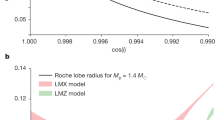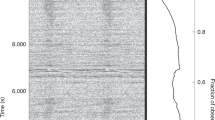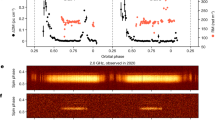Abstract
Sufficiently low magnetic field neutron stars which accrete for long times from a surrounding keplerian disk can be spun up to millisecond periods. After accretion ceases, such stars could become isolated or binary pulsars, depending on whether their companions have subsequently disrupted the binary by either their tidal break ups or their supernova explosions. Such pulsars constitute a new class, with short periods, long apparent ages (P/Ṗ ≳ 108 yr) and pulsed optical, X-ray and γ-ray fluxes significantly below those expected for canonical pulsars with similar periods. Because of their long subsequent spin-down lifetimes, such pulsars would probably be observable if their birth rate exceeded even 10−4 that of the canonical ones. We propose here that the recently discovered millisecond pulsar 4C21.53 belongs to this new class, together with the binaries PSRs 1913+16, 0820+02 and 0655+64, as well as possibly several isolated pulsars such as PSRs 1952+29 and 1804−08. The possibility of such a class of fast accretion-spun-up pulsars has also been noted by Backus et al.1.
This is a preview of subscription content, access via your institution
Access options
Subscribe to this journal
Receive 51 print issues and online access
$199.00 per year
only $3.90 per issue
Buy this article
- Purchase on Springer Link
- Instant access to full article PDF
Prices may be subject to local taxes which are calculated during checkout
Similar content being viewed by others
References
Backus, P. R., Taylor, J. H. & Damashek, M. Astrophys. J. Lett. 255, L63 (1982).
Swank, J. H. et al. Astrophys. J. Lett. 212, L73 (1977).
van Paradijs, J. Nature 274, 650 (1978).
Ohashi, T. et al. Astrophys. J. 258, 254 (1982).
Oda, M. in Proc. 10th Texas Symp. (in the press).
Lewin, W. H. G. & Clark, G. W. Ann. N. Y. Acad. Sci. 336, 451 (1980).
Ayasli, S. & Joss, P. C. Astrophys. J. 256, 637 (1982).
van den Heuvel, E. Proc. IAU Symp. 95, 379 (1981).
Angel, J. R. P. A. Rev. Astr. Astrophys. 16, 487 (1978).
Blandford, R. D., Applegate, J. H. & Hernquist, L. Preprint (Caltech., 1982).
Flowers, E. G. & Ruderman, M. A. Astrophys. J. 215, 302 (1977).
van den Heuvel, E. Ann. N. Y. Acad. Sci. 302, 14 (1977).
Chau, W. Y. Astrophys. J. 219, 1038 (1978).
Davidson, K. & Ostriker, J. P. Astrophys. J. 179, 585 (1973).
Ghosh, P. & Lamb, F. K. Astrophys. J. 234, 296 (1979).
Manchester, R. N. & Taylor, J. H. Pulsars (Freeman, San Francisco, 1977).
Wang, Z. & Chu, Y. Proc. IAU Symp. 95, 217 (1981).
Smarr, L. L. & Blandford, R. D. Astrophys. J. 207, 574 (1976).
Backer, D., Kulkarni, S., Heiles, C., Davies, M. & Goss, M. IAU Circ. No. 3743 (1982); Nature 300, 615 (1982).
Author information
Authors and Affiliations
Rights and permissions
About this article
Cite this article
Alpar, M., Cheng, A., Ruderman, M. et al. A new class of radio pulsars. Nature 300, 728–730 (1982). https://doi.org/10.1038/300728a0
Received:
Accepted:
Issue Date:
DOI: https://doi.org/10.1038/300728a0
This article is cited by
-
FAST unveils a new era in the discovery of long-period pulsars in globular clusters
Science China Physics, Mechanics & Astronomy (2024)
-
Searches for continuous-wave gravitational radiation
Living Reviews in Relativity (2023)
Comments
By submitting a comment you agree to abide by our Terms and Community Guidelines. If you find something abusive or that does not comply with our terms or guidelines please flag it as inappropriate.



